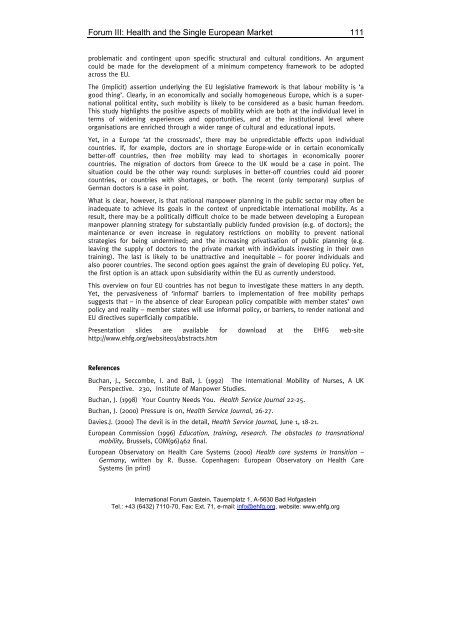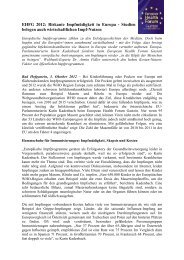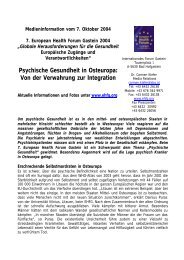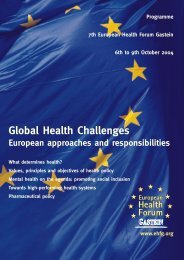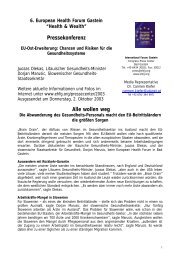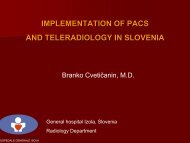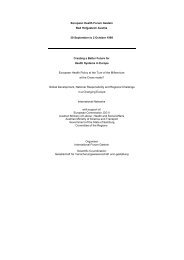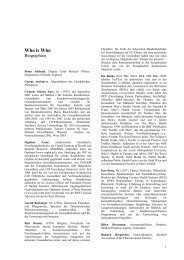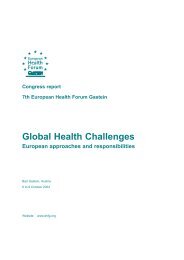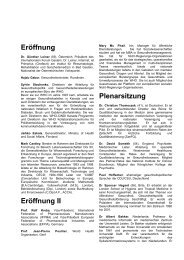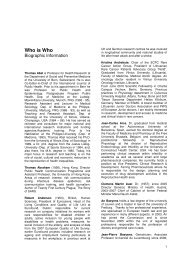Congress report - European Health Forum Gastein
Congress report - European Health Forum Gastein
Congress report - European Health Forum Gastein
Create successful ePaper yourself
Turn your PDF publications into a flip-book with our unique Google optimized e-Paper software.
<strong>Forum</strong> III: <strong>Health</strong> and the Single <strong>European</strong> Market<br />
problematic and contingent upon specific structural and cultural conditions. An argument<br />
could be made for the development of a minimum competency framework to be adopted<br />
across the EU.<br />
The (implicit) assertion underlying the EU legislative framework is that labour mobility is ‘a<br />
good thing’. Clearly, in an economically and socially homogeneous Europe, which is a supernational<br />
political entity, such mobility is likely to be considered as a basic human freedom.<br />
This study highlights the positive aspects of mobility which are both at the individual level in<br />
terms of widening experiences and opportunities, and at the institutional level where<br />
organisations are enriched through a wider range of cultural and educational inputs.<br />
Yet, in a Europe ‘at the crossroads’, there may be unpredictable effects upon individual<br />
countries. If, for example, doctors are in shortage Europe-wide or in certain economically<br />
better-off countries, then free mobility may lead to shortages in economically poorer<br />
countries. The migration of doctors from Greece to the UK would be a case in point. The<br />
situation could be the other way round: surpluses in better-off countries could aid poorer<br />
countries, or countries with shortages, or both. The recent (only temporary) surplus of<br />
German doctors is a case in point.<br />
What is clear, however, is that national manpower planning in the public sector may often be<br />
inadequate to achieve its goals in the context of unpredictable international mobility. As a<br />
result, there may be a politically difficult choice to be made between developing a <strong>European</strong><br />
manpower planning strategy for substantially publicly funded provision (e.g. of doctors); the<br />
maintenance or even increase in regulatory restrictions on mobility to prevent national<br />
strategies for being undermined; and the increasing privatisation of public planning (e.g.<br />
leaving the supply of doctors to the private market with individuals investing in their own<br />
training). The last is likely to be unattractive and inequitable – for poorer individuals and<br />
also poorer countries. The second option goes against the grain of developing EU policy. Yet,<br />
the first option is an attack upon subsidiarity within the EU as currently understood.<br />
This overview on four EU countries has not begun to investigate these matters in any depth.<br />
Yet, the pervasiveness of ‘informal’ barriers to implementation of free mobility perhaps<br />
suggests that – in the absence of clear <strong>European</strong> policy compatible with member states’ own<br />
policy and reality – member states will use informal policy, or barriers, to render national and<br />
EU directives superficially compatible.<br />
Presentation slides are available for download at the EHFG web-site<br />
http://www.ehfg.org/website01/abstracts.htm<br />
References<br />
Buchan, J., Seccombe, I. and Ball, J. (1992) The International Mobility of Nurses, A UK<br />
Perspective. 230, Institute of Manpower Studies.<br />
Buchan, J. (1998) Your Country Needs You. <strong>Health</strong> Service Journal 22-25.<br />
Buchan, J. (2000) Pressure is on, <strong>Health</strong> Service Journal, 26-27.<br />
Davies.J. (2000) The devil is in the detail, <strong>Health</strong> Service Journal, June 1, 18-21.<br />
<strong>European</strong> Commission (1996) Education, training, research. The obstacles to transnational<br />
mobility, Brussels, COM(96)462 final.<br />
<strong>European</strong> Observatory on <strong>Health</strong> Care Systems (2000) <strong>Health</strong> care systems in transition –<br />
Germany, written by R. Busse. Copenhagen: <strong>European</strong> Observatory on <strong>Health</strong> Care<br />
Systems (in print)<br />
International <strong>Forum</strong> <strong>Gastein</strong>, Tauernplatz 1, A-5630 Bad Hofgastein<br />
Tel.: +43 (6432) 7110-70, Fax: Ext. 71, e-mail: info@ehfg.org, website: www.ehfg.org<br />
111


